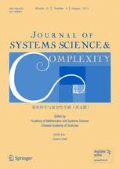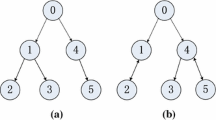Abstract
In this paper, robustness properties of the leader-follower consensus are considered. For simplicity of presentation, the attention is focused on a group of continuous-time first-order dynamic agents with a time-invariant communication topology in the presence of communication errors. In order to evaluate the robustness of leader-follower consensus, two robustness measures are proposed: the L 2 gain of the error vector to the state of the network and the worst case L 2 gain at a node. Although the L 2 gain of the error vector to the state of the network is widely used in robust control design and analysis, the worst case L 2 gain at a node is less conservative with respect to the number of nodes in the network. It is thus suggested that the worst case L 2 gain at a node is used when the robustness of consensus is considered. Theoretical analysis and simulation results show that these two measures are sensitive to the communication topology. In general, the “optimal” communication topology that can achieve most robust performance with respect to either of the proposed robustness measures is difficult to characterize and/or obtain. When the in-degree of each follower is one, it is shown that both measures reach a minimum when the leader can communicate to each node in the network.
Similar content being viewed by others
Reference
R. Olfati-Saber and R. M. Murray, Consensus problems in networks of agents with swithching topology and time-delays, IEEE Trans. Automatic Control, 2004, 49(9): 1520–1533.
R. Olfati-Saber, J. A. Fax, and R. M. Murray, Consensus and cooperation in networked multi-agent systems, in Proceedings of the IEEE, 2007, 95: 215–233.
J. A. Fax and R. M. Murray, Information flow and cooerative control of vehicle formation, IEEE Trans. Automatic Control, 2004, 49(9): 1465–1474.
A. Jadbabaie, J. Lin, and A. S. Morse, Coordination of groups of mobile autonomous agents using nearest neighbor rules, IEEE Trans. Automatic Control, 2003, 48(6): 988–1000.
L. Moreau, Stability of multiagent systems with time-dependent communication links, IEEE Trans. Automatic Control, 2005, 50(2): 169–182.
Z. Lin, M. Broucke, and B. Francis, Local control strategies for groups of mobile autonomous agents, IEEE Trans. Automatic Control, 2004, 49(4): 622–629.
W. Ren, R. W. Beard, and T. W. Mclain, Coordination variables and consensus building in multiple vehicle systems, In Kumar,V., Leonard, N. E., Morse, A.S., Cooperative Control, Lecture Notes in Control and Information Sciences, Springer, Berlin heidelberg, New York, 2005, 309: 171–188.
W. Ren and R. Beard, Consensus seeking in multi-agent systems under dynamically changing interaction topologies, IEEE Trans. Automatic Control, 2005, 50(5): 635–661.
W. Ren and E. Atkins, Distributed multi-vehicle coordinated control via local information exchange, Int. J. Robust and Nonlinear Control, 2007, 17(10–11): 1002–1033.
W. Ren, Second-order consensus algorithm with extensions to switching topologies and reference models, in Proceedings of the 2007 American Control Conference, 2007, 1431–1436.
A. V. Savkin, The problem of coordination and consensus achievement in groups of autonomous mobile robots with limited communication, Nonlinear Analysis, 2006, 65(5): 1094–1102.
K. L. Moore and D. Lucarelli, Decentralized adaptive scheduling using consensus variables, Int. J. Robust and Nonlinear Control, 2007, 17(10–11): 921–940.
W. Ren and R. W. Beard, Decentralized scheme for spacecraft formation flying via the virtual structure approach, AIAA Journal of Guidance, Control, and Dynamics, 2004, 27(1): 73–82.
G. Campa, S. Wan, M. R. Napolitano, B. Seanor, and M. L. Fravolini, Design of formation control laws for maneuvered flight, Aeronautical J., 2004, 108(1081): 125–134.
X. P. Chen and A. Serrani, An internal model approach to autonomous leader/follwer trailing for non-holonomic vehicles, International Journal of Robust and Nonlinear Control, 2006, 16(4): 641–670.
F. Ganji, S. S. Joshi, and D. S. Bayard, Adaptive formation control for rovers traveling over unknown terrains, Journal of Guidance Control and Dynamics, 2006, 29(3): 714–724.
N. Lechevin, C. A. Rabbath, and P. Sicard, Trajectory tracking of leader-follower formation characterized by constant line-of-sight angles, Automatica, 2006, 42(12): 2131–2141.
H. Takahashi, H. Nishi, and K. Ohnishi, Autonomous decentralized control for formation of multiple mobile robots considering ability of robot, IEEE Trans. Industrial Electronics, 2004, 51(6): 1272–1279.
P. K. C. Wang, Navigation strategies for multiple autonomous mobile robots moving in formation, J. Robotic Systems, 1991, 8(2): 177–195.
K. M. Zhou and J. C. Doyle, Essentials of Robust Control, Prentice Hall, Upper Saddle River, New Jersey, 1998.
S. G. Wang and Z. J. Jia, Inequalities in Matrix Theory, Anhui Education Publishing House, Hefei, 1993.
Author information
Authors and Affiliations
Corresponding author
Additional information
This work is supported by the National Natural Science Foundation of China under Grant No. 60774005.
Rights and permissions
About this article
Cite this article
Wang, J., Tan, Y. & Mareels, I. Robustness analysis of leader-follower consensus. J Syst Sci Complex 22, 186–206 (2009). https://doi.org/10.1007/s11424-009-9156-8
Received:
Revised:
Published:
Issue Date:
DOI: https://doi.org/10.1007/s11424-009-9156-8




